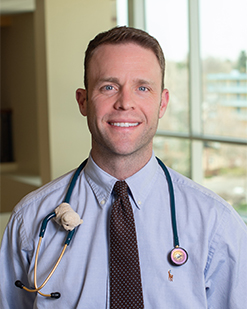Bronchopulmonary Dysplasia
This information was reviewed and approved by Divya Chhabra, MD, MMSc,, Pamela L. Zeitlin, MD, MPhil, PhD (8/23/2018).
What is Bronchopulmonary Dysplasia?
Bronchopulmonary dysplasia (BPD) is a chronic lung disease. It mostly affects babies who are born too early. About 40 percent of babies born at or below 28 weeks gestation (normal is 40 weeks) develop BPD. Babies with this condition need oxygen or assisted ventilation (help breathing).
Most infants with BPD recover. In rare cases it can be life-threatening or require long-term respiratory support. Babies with BPD have abnormal lungs. This affects the air spaces, airways and the lining of small blood vessels in the lungs. These babies may continue to have trouble breathing later in life. They may also benefit from close monitoring and support.
What are the causes of BPD?
The causes of BPD are not completely known. Some of the risk factors for developing BPD Include:
Prematurity (the lower the gestational age or birth weight, the higher the probability of developing BPD)
Male sex
Maternal smoking
Infections in the mother and intrauterine growth delay
Oxygen and assisted ventilation
These are often required help infants with BPD breathe better. They may cause further injury to the lungs.
PDA (patent ductus arteriosus)
Infection
Although not completely understood, genetics may also play a role in the development of BPD.
What are the symptoms of Bronchopulmonary Dysplasia?
The main symptoms are trouble breathing and the need for oxygen or assisted ventilation. The symptoms can be different for each infant. After discharge from the hospital some infants may continue to have sensitive airways.
They may develop wheezing or trouble breathing. Some infants with BPD may also have cough or increased work of breathing. This means fast breathing, nasal flaring and retractions (pulling in between the ribs) with feeding.
Increased work of breathing may make it hard for babies to gain weight. These infants should have regular weight checks, increased calories and supplemental feedings. They may require oxygen and breathing treatments.
These babies are also at high risk for developing respiratory distress with viral infections such as RSV. It is important to regularly measure lung function after recovery from BPD.
How is BPD diagnosed?
The health care provider will complete a thorough history and physical exam. BPD is a clinical diagnosis determined by the need for oxygen and assisted ventilation at certain stages during a child’s development. There are no specific tests to diagnose BPD or determine the severity of the disease. The following tests may be ordered by a health care provider:
Pulse oximetry determines oxygen needs during rest, feeding, sleep and activity.
A chest X-ray evaluates the extent of lung disease and determines whether air is being trapped from small airways inflammation or an infection.
A chest CT scan may help measure the severity of the lung disease.
Some infants who continue to be on diuretics may also require blood work occasionally to assess their electrolyte levels.
If a baby continues to have trouble swallowing, a tailored barium swallow exam may be ordered. This test determines whether a baby can regulate his or her feeding and protect the lungs from inhaling food or formula.
Some infants can also have gastroesophageal reflux which can cause trouble breathing and may require treatment.
Infants may also require heart evaluations to check for complications such as pulmonary hypertension, a known complication of BPD.
What are the goals of treatment of Bronchopulmonary Dysplasia?
The goal is to help the baby grow and develop. Providing calories and nutrients will also help the lungs to mature and improve. If the baby is on oxygen, the provider will discuss oxygen therapy details at the clinic visit.
How is BPD treated or managed?
There are no BPD-specific treatments. Effective treatment includes:
Adequate oxygen
Optimal nutrition through adequate calories and nutrients.
Preventing lung infections
Ensuring stomach acid and formula are not aspirated into the lungs.
Medications
Inhaled medications help with airway reactivity or wheezing.
Diuretics remove excess fluid from the lungs.
Medications for reflux and/or pulmonary hypertension help after leaving the hospital.
Monitoring and managing all respiratory illnesses closely.
Some infants may need the RSV immunoglobulin, a monthly shot during the RSV season.
Babies and caregivers should receive the flu vaccine every year. Babies will require two doses of the flu vaccine the first year. Make sure that all other immunizations are current.
Pay attention to hand washing and encourage family and friends to wash hands before holding the baby
Avoid crowded places and close contact with family members who are sick.
How Parents Can Monitor Bronchopulmonary Dysplasia
Closely monitor your baby’s breathing.
Call your health care provider if you notice fast breathing, nasal flaring, retractions (pulling in of the skin between the ribs), and bluish discoloration of the skin around the mouth or the nails or frequent alarms on the oximeter or apnea monitor.
Optimal nutrition is the key to lung development. A registered dietician can make recommendations for your baby.
Avoid infections by getting appropriate immunizations, washing hands frequently and avoiding crowds of people.
Avoid exposure to tobacco smoke.
National Jewish Health Can Help You
The Pulmonology team at National Jewish Health can work with you to achieve these goals. Our Pediatric Pulmonology providers can help you develop a plan for medications, oxygen and breathing treatments. They will also work with your cardiologist to assess the lung vessels and determine whether your baby needs to be on medications for pulmonary hypertension.
The trained team of nurses, respiratory therapists and registered dieticians can be your partners in the journey to good lung health and optimal growth.
Our Specialists
-

James Brock, DO
-

Elizabeth M. Fan, PA-C
-

Pamela L. Zeitlin, MD, MPhil, PhD
 Programs and Services
Programs and Services
Thousands of patients come to us from around the world to team with our expert physicians and researchers and seek treatment for respiratory, cardiac, immune and related conditions. Search our treatment programs.
 Clinical Trials
Clinical Trials
For more than 100 years, National Jewish Health has been committed to finding new treatments and cures for diseases. Search our clinical trials.
